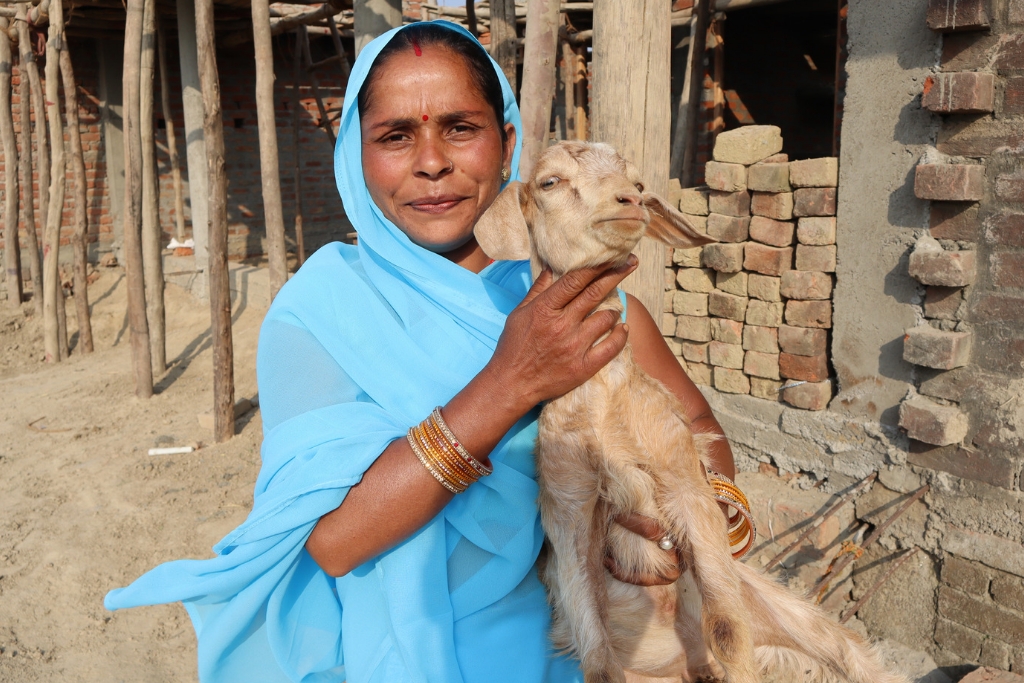
One woman’s mission to make goats healthier in UP villages
This 31-year-old resident of Bahraich district in Uttar Pradesh has become a a pashu sakhi to ensure goat health by taking care of vaccination, medical treatments and safe delivery of animals.
Goat rearing is a common livelihood activity for the villagers in Bahraich district, but they face multiple challenges, including lack of affordable and easily accessible veterinarian services. However, women like Saroj Devi, a pashu sakhi, bring affordable treatment for goats to the doorsteps of hundreds of rural families. Armed with a temperature-controlled box for medicine and vaccines, and a black bag for carrying other staples, Saroj, a 31-year-old resident of Raypur village in Risia administrative block, can easily be spotted walking through several villages and towns in Uttar Pradesh every day to provide medical services to goats.
Saroj Devi has been working as a pashu sakhi – which translates as ‘friend of animals’ – under the Akanshi Parivar Pariyojna run by the Aga Khan Foundation (AKF) since November 2023.
Also Read: Black goats of Kerala’s native tribal hill people on brink of extinction
Her responsibilities as a pashu sakhi include providing various services like deworming, neutering, vaccinations and treating illnesses of goats in the community and ensuring their health. The local women call her and describe the symptoms. When she understands what the underlying illness might be, she carries the appropriate medicine from home in her temperature-controlled box, and rushes to treat the goats. Pashu sakhis like Saroj Devi are crucial for helping with the delivery as well as post-delivery care of the goats , including vaccination against goat plague.
A year ago, Saroj Devi knew little more than feeding, cleaning and milking the couple of goats that she possessed. When she heard about the opportunity to become a pashu sakhi from Rekha, the AKF community coordinator, it was the remuneration that piqued her interest. She applied for the position, got selected after an interview, underwent training and soon began her field visits. Now she earns Rs 5,000-6,000 per month. “I’m proud to say that I pay for my daughter’s tuition now, and we have also been able to build a pukka house for ourselves.” Saroj has also bought a few heads of livestock out of her earnings.
Also Read: Rearing goats empower women in rural Bihar
Saroj Devi felt relieved when she started earning better. Her husband’s income as a construction labourer and sound system operator during festivals and weddings was often not enough. There were times when they could not buy books and school uniforms for their children. Having been through financial struggles to even pay for some basic household necessitates, she regards this work as a blessing. Her husband has been one of her biggest supporters. Initially, she used to feel shy and self-conscious about carrying her bag of medicines and vaccines. “I asked her to tie her shyness to a post, just like a goat, instead of burdening herself with it,” her husband said, laughing.
Saroj Devi’s everyday routine starts at 9 am and goes on till about 5pm. She conducts regular meetings with the women in her community and spreads awareness about a number of diseases affecting goats. She tells them how to increase the animals’ nutritional intake and educates them about the importance of regular vaccination. She also encourages other women to become pashu sakhis as well.
Also Read: How women are taking care of livestock health in UP
In her own backyard, Saroj Devi grows azolla, a protein-rich feed that supplements overall nutrition when fed to goats . She encourages other women to grow this plant in their own homes as well. “Usually there is some resistance to trying innovative methods of rearing livestock. People are more comfortable with sticking to the time-tested ones,” she said. However, once they start seeing the results, people change their mind.
While her work has led her to command greater social respect, Saroj Devi recounted a particular incident which served as the turning point in her career. One day, when she was about to begin her field visits, a neighbour came running to her house. “She said that her goat was starting to deliver its kid, but its head was not emerging smoothly,” she recounted. Saroj Devi rushed to the scene and guided the kid out. In a way, her quick thinking helped cement her capabilities as a pashu sakhi. She has so far treated over 500 goats in Uttar Pradesh, changing several lives for the better, including her own.
Also Read: Goats and poultry help tribal women turnaround impoverished lives
The lead image at the top shows Saroj Devi at work. (Photo by Sukanya Roy)
This story has been covered as part of a special collaboration between Village Square and the Aga Khan Foundation to highlight stories of change in Bahraich district of Uttar Pradesh under the Aspirational District Programme supported by Induslnd Bank’s CSR initiative.
Sukanya Roy is a freelance journalist based out of Kolkata, and she believes in crafting impactful stories on the themes of gender, human rights, sexuality, environment, and the lives of denotified tribes and communities in India.







